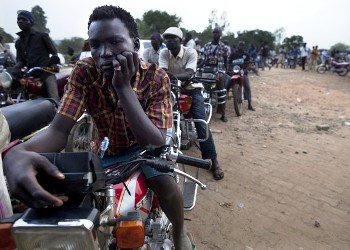Juba residents decry high costs of living
May 5, 2016 (JUBA) – People residing in the South Sudan capital, Juba have asked the newly formed transitional unity government to help improve the high costs of living.

The oil sector, which accounts for over 90 per cent of government revenues, has been badly affected the recent war, in addition to the decline in oil prices on world markets.
Commodity prices also shot up due to the devaluation of the local currency, South Sudanese pound, which has gravely impacted on the transport sector in the country.
The most affected are importers of food items and general household goods who have to deal with sharply increased prices to bring in goods from its neighbouring countries.
Oyet William, a commercial cyclist in the South Sudan capital, has to toil daily in order to fend for his family. His business has been badly hit by the high fuel prices.
“People are suffering always and that is how life goes on. In the case of food, if you go to a hotel, you will find a plate at 35 pounds and in some places it is 30 pounds,” Oyet says.
Initially, he adds, one would only pay just 5SSP for a plate of food.
Aisha Peter, a tea vendor in Juba, is also facing the country’s economic pinch.
“For sure, life in Juba is hard, without a job, you cannot survive and so one has to do a small business to let kids get food, we are doing this because children have to school and get food,” she told Sudan Tribune Thursday.
The conflict, which broke out in 2013, has negatively impacted on the nation’s citizens, including pushing the country to the brink of famine with 5.8 million people, nearly half of the population, in desperate need of humanitarian assistance, a joint United Nations assessment report recently-showed.
South Sudan, one of the world’s poorest nations, has worst indicators on health, development and education.
(ST)
